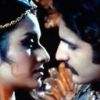Friends, although the Tuesday episode of the serial was also a sort of medley of many things, there was one high note on the anniversary of Jalal's conquest of Delhi and Agra from Hemu - and that was the release of the twin-religion promoting sikkas among the praja, and then in the backdrop of some protests by some maulvis, a Hindu citizen came forth with a scroll on which he had simply written the word "Akbar". The simple man, with his simple happiness caused by his benevolent king, decided to give Jalal the additional title of people's love called "Akbar" (the Great!).
Everybody among the court officials, the royal family and the praja was stunned for a moment before loud cheers erupted. In the royal enclosure Jodha was beaming with pride and satisfaction. A brief shot of the Akbar Ka Makabra followed, where Jodha's soul told Jalal's soul "I always had to call you "Shahenshah" but I could never get the guts to call you by your first name "Jalal" ... but "Akbar" was a name I could gladly call you by that did not trammel on husband-wife traditions."
I thought that moment was very sweet when Jalal realised for the first time that there was reciprocity from the people towards himself. For the first time, he had not had to fight wars for the title, but on the anniversary of his annexation of Delhi and Agra, the people honoured him with a title of their own good hearts and volition which was even more priceless than any conquest and hard-fought and won titles could be.
Jalal's face was a picture of disbelief and then utter gratitude. Earlier a few mualvis had protested his distribution of his special commemorative sikkas with the one side etched with the Muslim kalma and the other side etched with Radha Krishna. The maulvis would not accept such sikkas as it was against the rules of their religion. Hardly had Jalal explained to the maulvis that God is one and Hinduism and Islam were like two sides of the same coin, than his Hindu praja came forward with an honour title for him. It was not just in recognition of this sikka he was releasing for religious harmony but also for the abolishment of the teerth kar.
It must be noted that Jalal was the Mughal ruler of a predominantly Hindu citizenry, and so any accolade from the Hindus naturally outweighed any protest by the smaller number of Musllims who lived under his rule. But that did not seem to matter as a political tool to Jalal to get this honour from the Hindus. It mattered that the Hindus hearts and minds were won and were now overwhelmingly appreciative of his rule!
For those who want to know what else happened in the story, here's a quick gist:
The episode opened with the scene where Jodha is asked by Rahim to please quickly produce a baby just like Krishna's parents out of love bore him. Jodha unable to tackle Rahim's trend of questioning, then quietly bade Zakira and Moti to take him back to his mother, while Jalal lingered to hear Jodha's answer, with a wicked grin on his face. "Rahim has asked you the same question that is in my heart Jodha Begum" Jalal said, even as Jodha was doing a good act of feeling outraged by Rahim's question. "And besides you know I saw that special dream this morning, so tell me ... when will my dream come true?" Jalal caught hold of Jodha's hand before she could escape answering him, their eyes met as they drew closer, and Jodha then lost her shyness in her feelings of love for him as she leant against his shoulder and let him hug her. It was a very pretty moment.
In another part of the palace, Shehnaaz was seen writing a paigam to someone and from her dialogues to herself it was clear that she wanted to get "badla" on Jalal for incarcerating her mother, as well as get her grip on the Delhi and Agra takhts for herself. She was writing to the recipient of the paigam that she needed immediate help to achieve these two ends.
A beautiful DEK scene then followed. Jalal announced that this day was very special as it was the day he had conquered and won Delhi and Agra from Hemu, and it would all not have been possible without the mentoring and guiding hand of his "Khan Baba" Bairam Khan. The courtiers insisted on there being a re-coronation of sorts that day, and aptly Salima Begum was given the distinction of placing the crown on Jalal's head in memory of her late husband Bairam Khan. That was a terribly touching moment as Salima remembered the husband she had loved so much - as she stalled in her actions overcome by personal grief. But Hamida gently coaxed her to continue on, and she crowned Jalal. Jalal then went into such elaborate praise of Bairam Khan that Salima's heart gladdened. She looked gratefully at Jalal. Jalal then told Atga that he was keen to meet the awaam also on this great day, and Atga set about organising it all.
Jodha in her room was getting ready for the meeting with the awaam when Jalal came into her room looking dashing and the two exchanged notes on how good they looked. But when Jalal praised Jodha's beauty she said to him that he must be having something in mind to get from her and that's why the "tareef". Jalal swore by pulling his own ears that he was telling the truth about her beauty! Jodha then said "Okay I have a wish. None of the Khas three begums will go with you to meet the awaam, or all three will go. There is no question of just Jodha alone going with Jalal!" Jalal got the hint and promised that he would take along all three of his khas wives!
We then saw shots of Ruq elaborately dressing up to shine at the occasion, even as Salima was asking her to hasten. Elsewhere in the palace, Shehnaaz was sour that this event marked a day of power for Jalal, and she told herself help would soon be here for her to grab all that was Jalal's from him! Jodha suddenly interrupted Shehnaaz's line of thought by appearing next to her, whereupon Shehnaaz again became her childish self and sidetracked Jodha with some childish prattle about Rahim!
In a rare shot after that, we saw Jodha with Shivani, walking towards Tejwant. After telling Tejwant to hereafter call her his "sister" (as "Jijisa") she then asked Tejwant to help create something special for the meeting with the awaam, which Tejwant was very happy to do as a project!
It then was time to go and meet the praja and Jalal came with Jodha first to see what exactly she had made Tejwant create for this occasion. It was a lovely idea ... Tejwant has created a larger-than-life version of the sikka with both its faces carrying the Hindu and Islamic etchings. He had then mounted the sikka on a frame and hung it on a rotating hinge on the frame so that the big sikka could be rotated easily to show both its sides to the public alternately. It was a lovely thought to educate the praja on what this sikka was all about by making a large replica of it and demonstrating its value. Jalal praised and thanked Jodha for this terrific idea,
Just then as Atga started distributing the sikkas to the praja, a murmur of protest erupted from two maulvis standing at the top of the queue. They voiced their dissent to the whole sikka idea and said it would be a wrong in the eyes of their religion for Muslims to accept messages on Hinduism. Atga got a bit flustered by the way the maulvis were protesting aloud in front of Jalal, but then Jalal said he would handle the maulvis himself. He asked them what their problem was and then told them "If you refuse to accept the sikkas just because of the Hinduism engravings, then you are again doing wrong to your own religion by not accepting what is engraved on the other side of the sikka that is a meaningful symbol of Islamic kalmas. Thus the coin is two sided, and one side cannot be accepted without also accepting the other side of the whole message. God is One and this coin shows his two sides as equal. After all, Jalal told the maulvis, they were all Mughals living in the land of the Hindus weren't they? They shared rivers and lifestyles, and ate the produce of the same earth. So why the difference? The maulvis were about to extend their arguments, when suddenly something beautiful happened.
A lone Hindu man from the crowd carrying a simple paper scroll made his way up to Jalal, and initially everyone thought him to be intending to attack Jalal. But Jalal encouraged him to come forward and he handed his scroll to Jalal. Atga was made to read it, and there was just the one word written on it in both Hindi and Urdu ... it said "Akbar".
The simple man said hereafter the praja wanted to entitle Jalal as "Akbar" (which meant "the Great"!) for just as Allah is called Great, Jalal was his embodiment on earth to his citizenry. Jalal was overwhelmed, there was a hush of silence as people felt the weight of the moment and realised that in the life of Jalal a huge turning point had taken place.
Jodha was overjoyed as Jalal kept looking at her ... and in the Akbar Ka Makabra scene that followed, Jodha's soul was seen saying "I always called you Shahenshah, but never by your name Jalal ... but now I want to keep calling you Akbar!"
Jalal's praises as Akbar were then set up as a chant by the people and they wished him a long life and a long reign. On that poignant moment, the episode ended. In the precap, Abul Mali was seen telling Sharif that the great, ruthless and invincinble "Jalal-hater" Begum Mahchuchak was now planning to enter Agra, and so Jalal had better watch out!
My comments on the episode:
Regarding this paigam sent by Shehnaaz ...
A big question: Could it be that the paigam sent by Shehnaaz was to Begum Mahchachuk? It sure looked like that! And what does that mean? Is Shenaaz a plant of Mahchuchak and not really the daughter of Chand Begum? There's a high possibility!
Maham was last seen saying the Gwalior Hakim should soon be able to set Chand Begum completely right (meaning she may be cured of her madness). Could it happen then that Chand Begum, once she comes to her proper senses then says Shehnaaz is not really her daughter at all because she does not have some significant birthmarks etc?
We have all always wondered how Shehnaaz who was supposed to have been separated from her mother as an infant could recognise her mother's picture. If Shehnaaz is not really Chand Begum's daughter at all, that then fits that she may have been exposed to the picture some time by Mahchuchak? And isn't it significant that while Abul Mali, the son-in-law of Mahchuchak was near Mathura was when Shehnaaz was also at the ashram near Mathura (probably having had word that Jodha had seperated from Jalal and was heading that way?)
Even now Abul mali seems to know that Mahchuchak was on her way to Agra, so it seems to indicate that Shehnaaz is part of the Kabul circus sent explicitly by Mahchuchak to anticipate Jodha at the ashram and then to ingratiate herself into the Agra palace as a plant.
At least the jigsaw pieces seem to fit better if Shehnaaz is not really Chand Begum's daughter but is taking on that guise for finding that farman herself that she could exploit to get the Delhi takht?
Regarding the moment when Jalal was given the title of Akbar ...
I personally initially thought the big cinematic moment when the Hindu man brought that scroll with the name "Akbar" written on it could have been grander. In the movie Jodha Akbar it is portrayed as a very grand moment, with the people all chanting "Akbar, Akbar, Akbar".
But then I thought about it again and I seemed to like the stark simplicity with which this really huge moment was shown, and in a way it seemed to better exemplify the quieter and more heartfelt voice of the Hindus to give something so great so quietly to the King!
Regarding Jalal's wish that Jodha should make his dream come true fast!
Frankly, folks I still cannot understand how Jalal can ask Jodha "Will you make my dream for a child come fast?" when it is all up to his own speed? I felt like replying him myself that f he slept alone less and had fewer private dreams, and he slept more with Jodha, there was a greater chance of his dreams coming true!
I wish the Creatives would show more of the husband-wife sleeping together after the SR rather than convert Jalal into a semi-monk after the SR. Honestly, is this the land of fairy tales where babies are so easily conceived with just one SR between the parents? However romantic the notion, surely there has to be more reality in the story?
Regarding the Salima moment at the DEK ...
I thought that DEK scene was superb not just for Jalal or his speech about how he got to rule Delhi and Agra, but for the moments when he started talking about Bairam Khan in his life and said but for his "Khan Baba" all this he had today would not be his. I thought it was so beautiful when Salima was chosen as the person best fit for re-crowning Jalal , standing in the place of her late husband.
But the moment Salima was overcome by personal grief and sorrow at his memory and couldn't proceed further, and Hamida has to gently nudge her to go on, was lovely. Doesn't it make you all wonder how the gentle, gracious and dignified Salima could ever have so loved this absolutely barbaric and ruthless man Bairam Khan (who thought nothing of goring out the eyes of a sipahi who did not watch where Jalal had disappeared to?)
What kind of a love was that where this gentle dove of a lady fell in love and still loved the hawk of a man Bairam Khan? Love is strange. All his barbarism must have been as nothing to Salima, or she wouldn't still be carrying a torch for Bairam despite now being married to Jalal. Jalal too knows of her eternal love for Bairam and keeps her dignity by not approaching her as his sleeping mate ever! I love this classy relationship between Jalal and Salima that always looks like a triangle despite Bairam not being physically there to make up the third in that equation!
Regarding the status of Shivani and Tejwant ...
I am glad the Creatives brought Shivani and Tejwant back in the picture briefly if only to show us that these two are still at Agra. But it seems rather odd that this unmarried couple are allowed to stay on endlessly at Agra in close proximity to each other despite their marriage not having happened. We heard rumours that Jalal was planning a big wedding for Shivani, but instead the whole of Agra now seems to be acting as chaperone for Shivani.
I wouldn't be surprised if the Creatives have totally forgotten Shivani's wedding, and instead show us later that Shivani and Tejwant were already technically married via some mandir shaadi that they had already done, and thus Jalal's wedding for them was just an elaborate reconfirmation of their married status. If such an explanation is not given, I wonder how Bharmal is allowing their continued stay together in Agra?
Regarding the symbolism of the Hindu man giving Jalal the Akbar title ...
Two points strike me strongly about the way the Hindus man was made to present Jalal with the "Akbar" title. This Hindu man's approach towards Jalal came even as Jalal was still talking to the maulvis ... and the maulvis were still not quite satisfied with Jalal's explanation. The maulvis were outnumbered as it were when the Hindus overtook their protest by this act of entitling Jalal ... and so the maulvis had to look on in bewilderment when the Hindu praja began chanting the name of Jalal as Akbar. The maulvis protest story remains incomplete and will continue to be a thorn in the flesh of Jalal. The maulvis who strongly influence public opinion among the Mughals are shown as still completely anti-Hindu and only barely tolerating Jalal's penchant for an inclusive society.
The Hindus naturally outnumber the Mughals in the Sultanate because the Mughals captured what was essentially Hindu land first and became the powerful minority Muslim rulers of a majority Hindu state. The Hindu part of the population has now become Jalal's friend. They have seen more than one significant event when Jalal openly satisfied their needs and helped remove their burdens, and so their pledge of loyalty remains firm with Jalal. But the Hindus are by no means violent in their voicing of opinions nor warmongers in their attitude. They are essentially salt-of-the-earth kind of people with simple lives and few wants and all they crave is attention and some few benefits from the King who feels one among them.
On the other hand the Mughals are power conscious - at least the ones we have seen as opinion leaders of their fraternity. The Mughal nobles at court are treacherous and the religious section of the Mughals - the maulvis and ulemas - are actively against Jalal and not afraid to raise their voices to him. So far the silent majority seems to be on Jalal's side but we have to watch out for the minority with loud voices and sharp knives to see the real threat to Jalal and his peace.
I think it was extraorodinarily brave of a very young King like Jalal to be able to decide where his real loyal subjects were (and in this he was helped no end by his choice of wife, Jodha). Jalal actually seemed to make his choice in his life to let the silent Hindu majority protect him from the vociferous Mughal minority. It was a risk Jalal took after seeing which side his bread was buttered ...
The significance of Jodha in Jalal's life and her ascent in his life seems like a micro replica of the larger political atmosphere of the Sultanate and the macro drift of Jalal towards the Hindus. Jalal I think has started seeing his praja in Jodha and his Jodha in his praja now ... till the praja and Jodha seem inseprable anymore to him!























comment:
p_commentcount